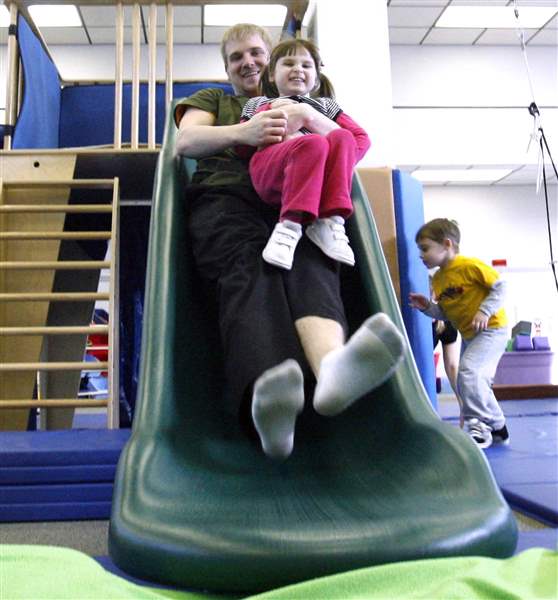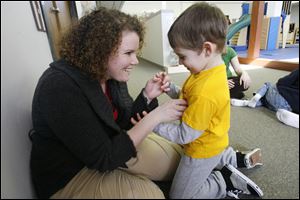
Autism programs focus on early intervention
3/7/2010
Intern Andrew Schoene accompanies Luke Lyons' twin, Lily, down a slide.
The Blade/Amy E. Voigt
Buy This Image

Melissa Grzybowski tickles Luke Lyons during a therapy session at Mercy Children's Hospital.
Lily Lyons was reading books while still in her crib, but speech continues to mostly elude the 3 1/2-year-old Toledo girl.
Although Lily didn't speak a word before enrolling in Mercy Children's Hospital's intensive preschool for autistic children in April, she now talks some - and uses a specialized picture book to communicate with her family. Her twin brother, Luke, who also is autistic and attends the same preschool, has advanced from speaking a few words to talking in complete sentences.
Such progress helps show that intensive early intervention is critical for those with autism, a developmental disability that can affect communication and behavior in varying degrees. Lily and Luke were diagnosed shortly after turning 2 and were enrolled in Mercy's Clinic Home Intensive Program in hopes of improving their education.
The twins' mother, Kris Lyons, said she suspected something was developmentally wrong with her only children before they were diagnosed. They underwent therapy for delayed speech and other issues before age 2, and a therapist suggested they visit a developmental pediatrician to determine whether they have autism.
"Of course it was heartbreaking, but I wanted to face it head on," Mrs. Lyons said. "They are my kids. I wanted to give them the best life they possibly can have."
The Mercy Children's Hospital program is in its second 12-month session, which serves a dozen autistic preschoolers for 24 hours a week in Holland. The program started seven years ago with intensive preschool sessions lasting a month each before expanding in 2008.
Other programs for autistic children from birth to age 6 are held at the 1049 South McCord Rd. preschool. The program blends approaches to prepare autistic children for school, and employees also work with parents and visit homes to address problems that families encounter.
"This diagnosis really requires a high degree of individual instruction," said speech pathologist Michelle Nagle, co-founder of the program.

Intern Andrew Schoene accompanies Luke Lyons' twin, Lily, down a slide.
"This is all we do," she added. "We live it. We breathe it."
Research shows that autistic children have better outcomes if they receive intensive early intervention, and Ms. Nagle and program co-founder Patty Cunningham, an occupational therapist, have years of experience, said Linell Weinberg, executive director of the Autism Society of Northwest Ohio.
"They're advocates for our kids," Ms. Weinberg said. "They've dedicated their professional lives to this population, which we appreciate so much."
Each autistic child has different needs, and ability to function also varies, therapists with Mercy's program say. Typically, autistic children need skills to be broken down and repeated much more than other youngsters.
Speech therapy, occupational therapy, and behavioral consulting are all part of the program, which has 10 employees.
Some children in Mercy's program, for example, are nonverbal. If they do not learn how to communicate through speech, pictures, or other means, they can become frustrated, which leads to slapping and other negative behavior, Mrs. Nagle said.
Meanwhile, some children are hypersensitive to touch, taste, and other senses. They need work with desensitizing so they are not distracted, Mrs. Cunningham said.
Some do so well after six months that they are able to spend part of their time at partner Gateway School in Toledo with other preschoolers, Mrs. Nagle said.
Derek Romstadt, who is nearly 6 and has Asperger's syndrome, an autism spectrum disorder, finished Mercy's yearlong program last summer. He is in kindergarten in the Northwood Local School District, said his mother, Amy Romstadt of Northwood.
"He's doing wonderful," Mrs. Romstadt said.
Before, Derek couldn't handle being around a lot of people because of sounds, was obsessed with shapes, had limited speaking abilities, and wouldn't play like other children. Although Derek continues to work on socializing, he is doing so well that his developmental doctor released him from regular visits, Mrs. Romstadt said.
"I never, ever in a million years thought he would get on a soccer field and play soccer," she said. "Now it's his favorite thing to do."
Locally, public schools also have preschool programs for developmentally disabled children, but typically they are not geared to autism and offer just 10 to 12 hours a week of instruction, said Ms. Weinberg of the Autism Society of Northwest Ohio.
Toledo Public Schools has a full-day preschool program for autistic children, although they spend part of their day with other peers, Mrs. Weinberg said. Other local early intervention programs for autistic children include Capable Kids in Sylvania and the School for Autistically Impaired Learners in Toledo, she said.
ProMedica Health System is considering offering an early intervention program for autistic children. And it is collaborating with other community groups, including the local Autism Society and Great Lakes Center for Autism, to open an autism center at Toledo Children's Hospital for families to connect with various services, said Catina Harding, executive director of the Great Lakes Center for Autism.
"Locally, what we hear from families is that services are really disjointed," Ms. Harding said.
The Mercy Children's Hospital program - which includes 1,500 hours of therapy - costs $30,000 per child, although $20,000 is covered by a state grant and other funding is available.
"It's like paying for college when your child is 2 years old," said Mrs. Lyons, noting she has double the expense.
The program has helped the Lyons family communicate, and Lily no longer throws lengthy temper tantrums out of frustration, Mrs. Lyons said. The twins play with toys, feed themselves, and do other tasks too, she said.
"We feel so lucky to be in this program," she said. "It's been a blessing. They're totally different then they were when they started."
Contact Julie M. McKinnon at:
jmckinnon@theblade.com
or 419-724-6087.